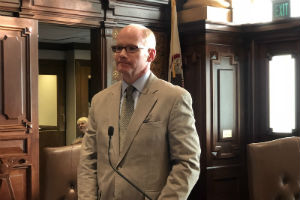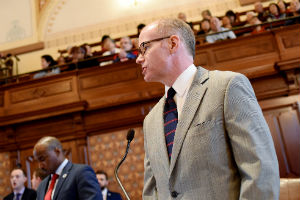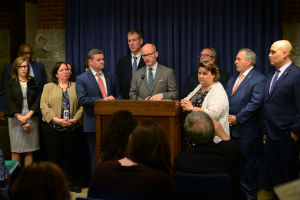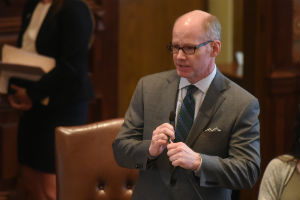- Details
- Category: News
 SPRINGFIELD – A bipartisan plan to regulate gun dealers and reduce the number of illegal guns being used to commit crimes in the state was sent to the governor today.
SPRINGFIELD – A bipartisan plan to regulate gun dealers and reduce the number of illegal guns being used to commit crimes in the state was sent to the governor today.
Senate Bill 337, sponsored by State Senator Don Harmon (D-Oak Park), is the result of a bipartisan compromise that took place after Gov. Bruce Rauner vetoed a similar measure on March 13.
“This bill took into consideration the governor’s concerns about red tape,” Harmon said. “Seeing the bipartisan support it received in both the House and the Senate, I look forward to the governor honoring his commitment to public safety and signing it into law.”
Senate Bill 337 contains provisions to better record and track private gun sales. It treats all firearm licensees the same, regardless of their size. It requires the Illinois State Police, rather than the state agency that regulates professions and occupations, to certify gun dealers.
Additional provisions in the bipartisan proposal include:
• requiring gun dealers to safely store firearms at all times,
• requiring gun dealers to make copies of FOID cards or IDs and attach them to documentation detailing each gun sale,
• requiring employees to undergo annual training about the law and responsible business practices, and
• requiring gun dealers to open their place of business for inspection by state and local police.
Senate Bill 337 passed both the House and the Senate on a bipartisan vote and heads to the governor’s desk for consideration.
- Details
- Category: News
 SPRINGFIELD – Senator Don Harmon (D-Oak Park) announced $45,000 in new funding to remodel and renovate the Elmwood Park Public Library’s public service area.
SPRINGFIELD – Senator Don Harmon (D-Oak Park) announced $45,000 in new funding to remodel and renovate the Elmwood Park Public Library’s public service area.
Elmwood Park’s library is one of 15 statewide to be awarded a Live and Learn Construction grant. Secretary of State and State Librarian Jesse White has awarded $724,424 in grants this year to help pay for essential capital improvements.
“Libraries play a central role in our communities and provide invaluable resources,” Harmon said. “I am pleased that Elmwood Park’s library received this recognition from the state.”
Information concerning the Illinois State Library’s Live and Learn Construction grant program can be found at http://www.cyberdriveillinois.com/departments/library/grants/livelearn_construction.html.
- Details
- Category: News
 SPRINGFIELD – The Illinois Senate today approved a bipartisan initiative to regulate gun dealers and reduce the number of illegal guns being used to commit crimes in the state.
SPRINGFIELD – The Illinois Senate today approved a bipartisan initiative to regulate gun dealers and reduce the number of illegal guns being used to commit crimes in the state.
Senate Bill 337 is sponsored by State Senator Don Harmon (D-Oak Park) and builds on a similar measure he sponsored that Gov. Bruce Rauner vetoed March 13. Lawmakers were unable to override the veto despite urging from Chicago Cardinal Blase Cupich, medical professionals who treat gunshot victims and others.
“We are back with a much better bill that addresses the governor’s concerns about small businesses, but we are doing so without compromising public safety,” Harmon said.
Senate Bill 337 contains provisions to better record and track private gun sales. It treats all firearm licensees the same, regardless of their size. It requires the Illinois State Police, rather than the state agency that regulates professions and occupations, to certify gun dealers.
To crack down on illegal transfers after a gun purchase, it establishes a penalty for those who fail to maintain a record of private gun sales and requires the state police to make key information about guns used in crimes available to the public.
Additional provisions in the bipartisan proposal include:
• requiring gun dealers to safely store firearms at all times,
• requiring gun dealers to make copies of FOID cards or IDs and attach them to documentation detailing each gun sale,
• requiring employees to undergo annual training about the law and responsible business practices, and
• requiring gun dealers to open their place of business for inspection by state and local police.
Senate Bill 337 was approved 35-18 and will be sent to the House for consideration.
“This is a sensible measure that satisfies everyone’s concerns,” Harmon said. “It doesn’t compromise our objectives, nor does it infringe on anyone’s 2nd Amendment right to buy, sell or own a firearm. I look forward to passage in the House and to Gov. Rauner signing it into law.”
- Details
- Category: News
 SPRINGFIELD – State Senator Don Harmon (D-Oak Park) joined Democratic and Republican lawmakers today to announce a new effort to tackle the issue of illegal guns being used in crimes in Illinois.
SPRINGFIELD – State Senator Don Harmon (D-Oak Park) joined Democratic and Republican lawmakers today to announce a new effort to tackle the issue of illegal guns being used in crimes in Illinois.
The legislation, Senate Bill 337, incorporates portions of Harmon’s Gun Dealer Licensing Act, which Gov. Bruce Rauner recently vetoed, as well as provisions to better record and track private sales.
“We took seriously concerns about the bureaucracy included in the Gun Dealer Licensing Act,” Harmon said. “This legislation provides much-needed oversight on gun purchases without creating a new bureaucracy.”
Harmon’s measure would require the Illinois State Police, rather than the Illinois Department of Financial and Professional Regulation, to certify dealers.
The legislation also treats all firearm licensees the same, eliminating exemptions for small and large dealers to focus on their actions, not their size.
To crack down on illegal transfers after a gun is purchased, the measure puts in place a penalty for individuals who fail to maintain a record of a private sale and requires State Police to make key information about guns used in crimes available to the public.
“We recognize that blame does not lie solely on the dealer when someone uses a gun to commit a crime,” Harmon said. “By certifying gun dealers and implementing better practices to track straw purchasers, we hope to be able to make it harder for someone to use an illegal gun to commit a crime.”
Several key provisions from the Gun Dealer Licensing Act are :
• requiring gun dealers to implement a safe storage plan for firearms during retail hours and after closing,
• requiring the posting of signage reminding employees and customers to keep guns out of the hands of people who shouldn’t have access,
• requiring certified licensees to make a copy of the buyers or transferee’s valid FOID card or ID and attach it to the documentation detailing the sale,
• requiring employees to have annual training regarding legal requirements and responsible business practices,
• and requiring certified licensees to have their place of business open for inspection by the State Police and local law enforcement.
Senate Bill 337 awaits action in the Senate.
- Details
- Category: News
 SPRINGFIELD – State Senator Don Harmon (D-Oak Park) passed legislation today that would create safe zones in Illinois in which immigration enforcement is limited.
SPRINGFIELD – State Senator Don Harmon (D-Oak Park) passed legislation today that would create safe zones in Illinois in which immigration enforcement is limited.
The measure requires the attorney general to put in place a model policy by April 1, 2019, on limiting assistance with immigration enforcement to the fullest extent permissible at locations including state-funded schools, state-funded medical treatment and health care facilities, public libraries, facilities operated by the secretary of state and state courts.
These safe zones were in the original version of the Trust Act that passed the Senate but were amended in the House and not in the final version signed by Gov. Bruce Rauner last year.
“I represent a diverse district that includes immigrant families who make invaluable contributions to their community,” Harmon said. “I want my constituents to feel safe when they do routine things like visit the doctor or take their children to school, not fear that they’ll be treated like criminals.”
A 2014 study by the Illinois Coalition for Immigrant and Refugee Rights found that roughly 68 percent of undocumented immigrants participate in the labor force in Illinois, a higher rate than that of the general public (66 percent).
According to a 2011 memorandum, it is the U.S. Immigration and Custom Enforcement’s official policy to avoid enforcement activities at “sensitive locations” like schools, day cares, medical facilities and courthouses. This guidance is nonbinding, however, and the Illinois Supreme Court has recorded numerous arrests of immigrants at courthouses in the past year.
“I believe the current political climate has left immigrants feeling horribly vulnerable,” Harmon said. “I hope this legislation gives them a sense of security in the state they call home.”
Senate Bill 35 passed the Senate 31-16 and now heads to the House for consideration.




